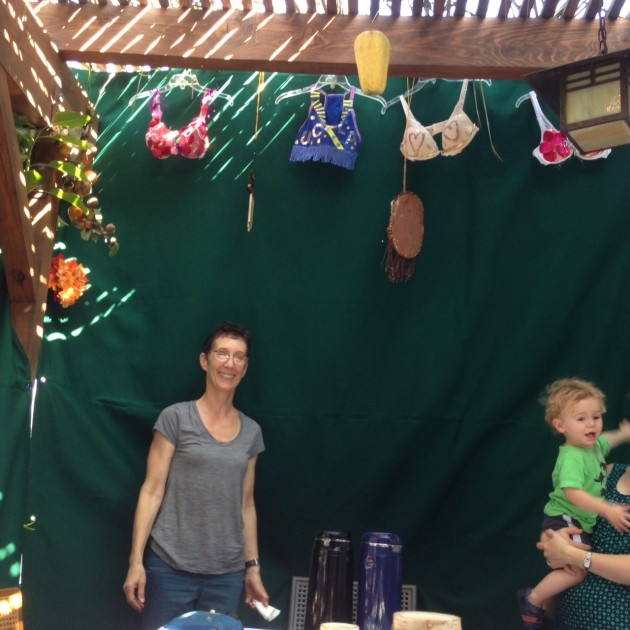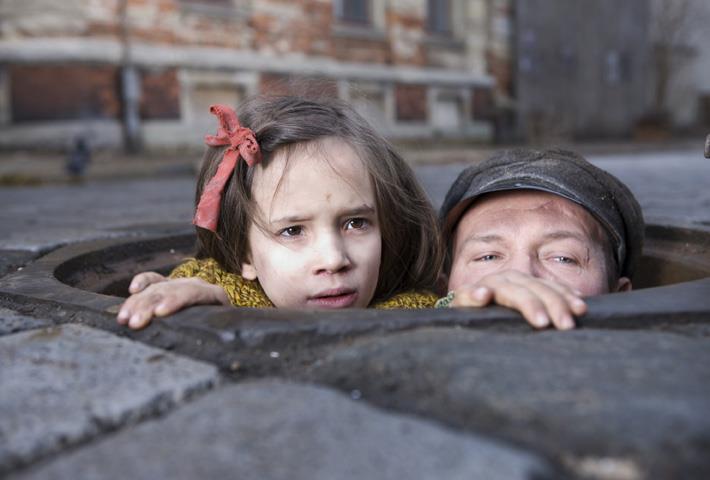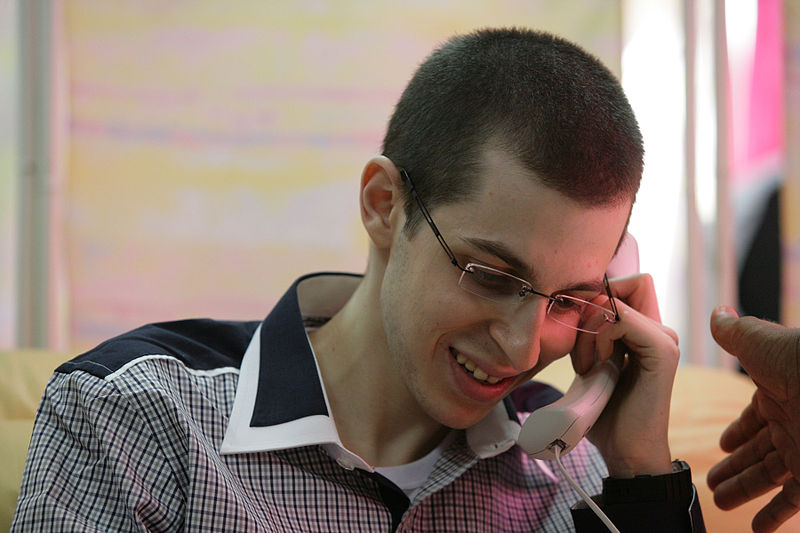Author Archives: Naomi Danis
October 31, 2017 by Naomi Danis
My Post-Holocaust American Halloween
 My mom was a European-born Holocaust survivor, and trick-or-treating was out of the question for her children when my sisters and I were growing up in the late 1950s and early 60s. Halloween, to her, was based on some saint’s holiday twisted into an occasion for anti-Semitic pranks and graffiti. Some of our Jewish day school classmates were allowed to knock on doors collecting money for Unicef, as an acceptable Jewish alternative, transforming the holiday into an occasion for tzedaka, but this too was forbidden us. Of course some of our classmates were from families we thought permissive, and observed Halloween in full regalia, as an American holiday, though I don’t think they felt comfortable bragging about it in school. We were told we had Purim, a superior holiday, because it was an occasion for dressing up, but also for giving shalach manot, rather than taking things from people.
My mom was a European-born Holocaust survivor, and trick-or-treating was out of the question for her children when my sisters and I were growing up in the late 1950s and early 60s. Halloween, to her, was based on some saint’s holiday twisted into an occasion for anti-Semitic pranks and graffiti. Some of our Jewish day school classmates were allowed to knock on doors collecting money for Unicef, as an acceptable Jewish alternative, transforming the holiday into an occasion for tzedaka, but this too was forbidden us. Of course some of our classmates were from families we thought permissive, and observed Halloween in full regalia, as an American holiday, though I don’t think they felt comfortable bragging about it in school. We were told we had Purim, a superior holiday, because it was an occasion for dressing up, but also for giving shalach manot, rather than taking things from people.
- No Comments
May 8, 2017 by Naomi Danis
A Rant Before Mother’s Day
 People raising young children can use all the enthusiastic appreciation and thoughtful support they can get for the rewarding—but also exhausting—caregiving challenges they face. Those of us on the sidelines might certainly lend a hand, cheer them on, and let them know we value what they do. But sometimes peers, well-intentioned relatives, and even educators and others unwittingly add to parents’ self-doubts and uneasy self-scrutiny by accidentally reinforcing outdated notions of what families are and how households are “supposed” to function.
People raising young children can use all the enthusiastic appreciation and thoughtful support they can get for the rewarding—but also exhausting—caregiving challenges they face. Those of us on the sidelines might certainly lend a hand, cheer them on, and let them know we value what they do. But sometimes peers, well-intentioned relatives, and even educators and others unwittingly add to parents’ self-doubts and uneasy self-scrutiny by accidentally reinforcing outdated notions of what families are and how households are “supposed” to function.
Young children today are being raised by (choose one or more): single parents, two parents, a different-sex unmarried couple, same-sex couples, at-home parents, working parents, parents who work at night, parents who work during the day, long-distance-working parents, grandparents, foster parents, separated parents, divorced parents, parents in the military, incarcerated parents and parents with more than one child in different educational settings. And sometimes young children, no matter what the configuration at home, have to cope also with having a deceased parent. The permutations and combinations are myriad.
So let’s make sure that in all the anticipatory hoopla connected to Mother’s Day (and Father’s Day) we don’t raise another generation of children with antiquated, ignorant and unintentionally hurtful notions about the truly diverse nature of human families.
- No Comments
September 16, 2016 by Naomi Danis
History on Trial: The Docudrama
 I hope there will be lots of conversation about “Denial,” the riveting new docudrama about eminent historian Deborah Lipstadt’s fight to defend her scholarship against a vicious Holocaust denier. The libel suit brought against the Emory professor–and her publisher–by David Irving, whom she described as a Holocaust denier in her 1993 book Denying the Holocaust: The Growing Assault on Truth and Memory. Irving brought the suit in England, where in such cases the defendant has to prove her innocence, the opposite of the American system, where in such cases the defendant has to be proven guilty.
I hope there will be lots of conversation about “Denial,” the riveting new docudrama about eminent historian Deborah Lipstadt’s fight to defend her scholarship against a vicious Holocaust denier. The libel suit brought against the Emory professor–and her publisher–by David Irving, whom she described as a Holocaust denier in her 1993 book Denying the Holocaust: The Growing Assault on Truth and Memory. Irving brought the suit in England, where in such cases the defendant has to prove her innocence, the opposite of the American system, where in such cases the defendant has to be proven guilty.
The film, in which Rachel Weisz stars, is based on Lipstadt’s 2005 book History on Trial: My Day in Court with a Holocaust Denier (2005). This screenplay, written by David Hare, may be indicative of a new 21st-century era of Holocaust film tackling a fundamental question we haven’t needed to ask in quite this way until now: How do we know what we know?
In the trial, for strategic reasons, and also to protect them from abusive bullying by the bigoted plaintiff, the defense kept upset Holocaust survivors from testifying. And, following the unilateral decision of her expert barrister and solicitor, supported by a large team of researchers, Lipstadt was kept off the stand too.
All clear thinkers agreed that it would be an absolute disaster if the case were lost. Some, including leaders of the British Jewish community, urged Lipstadt to settle the case out of court, but she insisted on fighting the charge directly.
One small and perhaps not so incidental detail about the film: it doesn’t throw in any extraneous romance to sell its story. We don’t learn anything about the relationship status of any of the characters, a tribute to the seriousness and sufficiency of the film’s subject.
Lipstadt (played wonderfully by Weisz)— is tough and relentless and often funny, like the historian herself—and the film powerfully connects the many themes of hatred spewed by Irving: his racism and sexism on top of his rampant anti-Semitism.
“Denial” is a film well worth seeing—and discussing.
- No Comments
October 15, 2014 by Naomi Danis
An Entirely New Sukkot Tradition, Involving—wait for it!–Bras.
 Sukkot in October coincides with Breast Cancer Awareness month, and brightly decorated bras inspired by Hadassah’s Project Uplift (the ones shown in this sukkah were decorated by Ellen Ackerman and her card group) made their appearance along with the usual hanging fruits and vegetables and colored paper chains. They enhanced my holiday experience in the Los Angeles sukkah of Teri Cohan Link and Baruch Link, along with great food and great company.
Sukkot in October coincides with Breast Cancer Awareness month, and brightly decorated bras inspired by Hadassah’s Project Uplift (the ones shown in this sukkah were decorated by Ellen Ackerman and her card group) made their appearance along with the usual hanging fruits and vegetables and colored paper chains. They enhanced my holiday experience in the Los Angeles sukkah of Teri Cohan Link and Baruch Link, along with great food and great company.
- No Comments
February 6, 2012 by Naomi Danis
Feminists in Focus: In Darkness on the Shortlist
 In Darkness, a film by Polish director Agnieszka Holland (Europa, Europa), is based on the true story of Leopold Socha (Robert Wieckiewicz), a Catholic sewer worker and petty thief who, though not especially fond of Jews, is willing to court danger in 1943 Nazi-occupied Lvov in order to make some easy cash, and hides a group of Jews underground for over a year.
In Darkness, a film by Polish director Agnieszka Holland (Europa, Europa), is based on the true story of Leopold Socha (Robert Wieckiewicz), a Catholic sewer worker and petty thief who, though not especially fond of Jews, is willing to court danger in 1943 Nazi-occupied Lvov in order to make some easy cash, and hides a group of Jews underground for over a year.
Jolanta Dylewska’s startlingly beautiful color cinematography lends a heartbreaking immediacy and vividness to all the lives depicted, and the film’s photographic feat creates a powerful contrast between the above ground light and the underground darkness, conveying more than a metaphorical moral gravitas. Shot in Polish, Ukrainian, Russian, German, Yiddish and even a little Hebrew–all with English subtitles–the film feels thankfully un-Hollywood, and it depicts a humanity replete with kindness and selfishness, cruelty and courage,fortitude and desperation, hope and goodness, with the Jewish characters, too, shown in all their human frailty.
There were moments in the film when I wanted to cover my eyes, like one of the characters who covered her own eyes and her daughter’s, but however troubling and terror-filled, this compelling film tells an important story we may never understand, but ignore at our peril. As the director noted, it continues to echo in different places in the world, from Rwanda to Bosnia.
- No Comments
November 15, 2011 by Naomi Danis
Feminists in Focus: Dolphin Boy
 I am an Israeli film junkie. Even though I visit my beloved other country often, I also depend on and delight in getting extra fixes of Israel vicariously through its films.
I am an Israeli film junkie. Even though I visit my beloved other country often, I also depend on and delight in getting extra fixes of Israel vicariously through its films.
When Meir Fenigstein’s Israel film festival comes to New York, for 25 years already, I am there. Each year, no matter how late the schedule is published, the theater always fills up. My theory is that we are a traumatized people, Israelis, and Jews, and that any time someone is retelling our story with imagination and courage, giving us a new narrative of familiar and often painful experiences, we want to hear and see what they have to say. We show up.
On Thursday night I wouldn’t have missed the opening of the 5th annual Other Israel Film Festival. This festival of films by and about Israel’s minority communities and especially the Arab citizens of Israel, is always provocative, sobering, bittersweetly entertaining–and if sometimes disheartening in its exposure of deeply felt injustices–always hope-inspiring because of the very fact of the festival’s existence.
The opening film this year, “Dolphin Boy,” a feature length documentary, is narrated in English (with subtitles for the Hebrew and Arabic) by an Israeli Jewish psychiatrist telling the story of his patient, a 17-year-old Palestinian Israeli young man, who is brought to him after a traumatic beating at the hands of other young men from his village avenging what they misconstrued as an “honor” violation. The film covers a period of four years of healing, and is a story about vulnerability and love, about relationships, between doctor and patient, father and son, boy and dolphins. This documentary like the arenas it portrays, medical treatment and nature, transcends politics.
- 1 Comment
October 18, 2011 by Naomi Danis
Waiting for Gilad
 I took my laptop to bed last night tuned to Ynet to wait and watch with the people of Israel for the release of Gilad Shalit, and it seemed to take forever. The logistics were complicated, the politics complex–I was reminded of Blu Greenberg’s comment that when there is a rabbinic will there is a halakhic way. Waiting, we were all suspended in a mix of longing, fear, hope, and sadness too. I love the barely restrained affectionate intrusive sense that everyone cares about each other in this still very young country. I believe that Aviva and Noam Shalit’s devoted tent dwelling and mobilization of others for an important cause should be an inspiration for other tent dwellers all over the world, whose efforts, will, I hope, bring about good. I pray for Gilad’s fulfillment in his freedom after captivity, and for peace among Israel and its neighbors.
I took my laptop to bed last night tuned to Ynet to wait and watch with the people of Israel for the release of Gilad Shalit, and it seemed to take forever. The logistics were complicated, the politics complex–I was reminded of Blu Greenberg’s comment that when there is a rabbinic will there is a halakhic way. Waiting, we were all suspended in a mix of longing, fear, hope, and sadness too. I love the barely restrained affectionate intrusive sense that everyone cares about each other in this still very young country. I believe that Aviva and Noam Shalit’s devoted tent dwelling and mobilization of others for an important cause should be an inspiration for other tent dwellers all over the world, whose efforts, will, I hope, bring about good. I pray for Gilad’s fulfillment in his freedom after captivity, and for peace among Israel and its neighbors.
Naomi Danis is Lilith’s managing editor.
- No Comments
June 14, 2011 by Naomi Danis
Sometimes We Say Hello
Cross-posted with United Synagogue of Conservative Judaism.
 The diplomat uses as many words as possible and tries to say nothing; the picture book writer uses as few words as possible and tries to say everything, according to Uri Shulevitz, famed children’s author and illustrator.
The diplomat uses as many words as possible and tries to say nothing; the picture book writer uses as few words as possible and tries to say everything, according to Uri Shulevitz, famed children’s author and illustrator.
Perhaps Shulevitz was following in the footsteps of Rabbi Akiva, who famously said that the essence of the Torah is to love your neighbor like yourself. The rest is commentary. I, too, aspire to write in that tradition of few words.
Judye Groner, editor and co-founder of Karben Books, patiently and graciously corresponded with me about a manuscript I sent her in 2007, Don’t Eat Yet, Don’t Drink Yet. Part of an online writing challenge, the story was inspired by my own children’s experiences at the Forest Hills Jewish Center, in Forest Hills, New York, in the early 1980s, when they were very young.
These excerpts from my emails to Judye are perhaps a commentary on (or a davening over) the 233 words that became It’s Tot Shabbat, my picture book, with photos by Tod Cohen, published by Karben in March 2011.
My notes reflect my concern not to make the introduction of religious experience merely the didactic conveying of rules. Like many Jews I am more interested in actions, in what we do or don’t do, and less interested in what people profess to believe. It is in this spirit that I do not mention God in the book. I don’t have a script for that conversation between parent and child, or child and parent, or child and child, certainly not one I comfortably can tell in the voice of a young child.
Every literary endeavor is an attempt to create some order and meaning out of the chaos of our experience, and perhaps the religious enterprise is acting on this same impulse. I wanted to make sure that the gentle but natural chaos of a child’s experience remains, that it isn’t erased by too much order. (more…)
- No Comments
 Please wait...
Please wait...